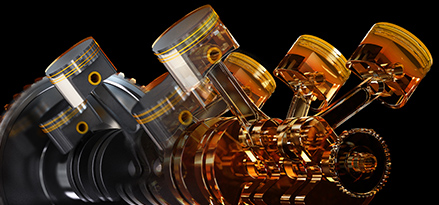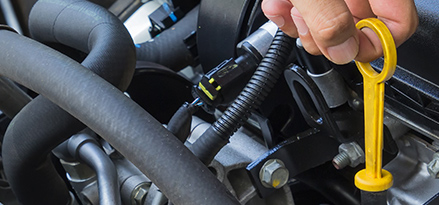The heat of midsummer and the ice of a deep winter put different stresses on wheels and engines – but the same components still need to work smoothly, efficiently and safely. For any trip, the most important thing is the safety and comfort of you and your passengers. Be sure to follow our regular maintenance tips but also be sure to plan your route, bring plenty of food and water, take enough breaks and drive with other road users in mind. If your car has an on-board computer, use it to test your efficiency and improve your driving. Heavy braking and hard acceleration aren’t just uncomfortable and fatiguing for passengers, they strain the engine and use a lot of fuel. Check out our 12 helpful tips to help improve your fuel economy.
Winter driving
For winter drivers – especially in places where the thermometer goes below zero – the right type of synthetic oil is crucial. In addition to our general recommendations, consider the following to prepare your vehicle for long journeys in extreme weather:
- Plan your journey and check the weather before you go so you don’t run into anything you’re not expecting
- Engines use more oil in winter conditions – carry some spare to be safe, you don’t want to be caught out in the cold
- Snow, sleet and ice can quickly block your view. Fill up your washer fluid with winter mix that has anti-freeze
- Tyre pressure should be slightly higher than usual in cold weather. The wrong tyre pressure doesn’t just mean higher fuel consumption, it can also make your vehicle harder to control
- Take warm clothing with you, a shovel and a blanket as well as food and drink. If you get stuck, you want to be prepared
Summer driving
For summer drivers, efficiency is key. People tend to drive further in the summer, and even small changes in fuel consumption may have a big effect on costs. Other things are important too though, so before you set off:
- Make sure that your cooling system has enough coolant in the right mix for the heat
- Check windscreen wipers and replace if necessary
- Fill up your windscreen fluid
- Check your pollen and air filters, replace them if necessary
- Give your car a thorough summer clean in dry conditions, wax the paintwork and wash the interior
- Check tyres, brakes and shocks, replace them if necessary
-

Car engine oil explained
Checking your oil regularly is important and can help prevent excess engine wear.
Learn more -

How to change your oil and oil filter
Frequent oil and filter changes are essential in helping your car and its performance.
Learn more -

Car care FAQ's
Understand more about how to use Mobil™ products to look after your vehicle and keep your engine running smoothly.
Learn more




